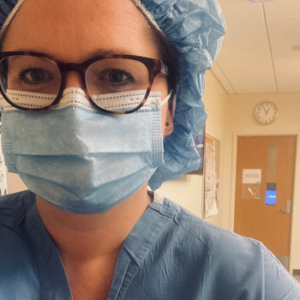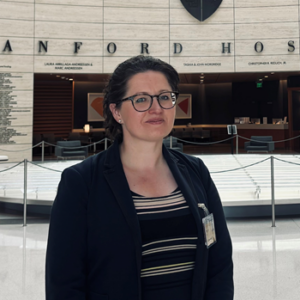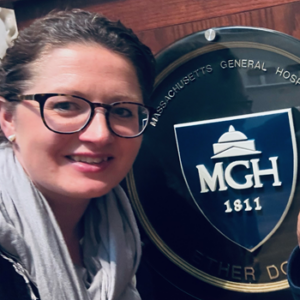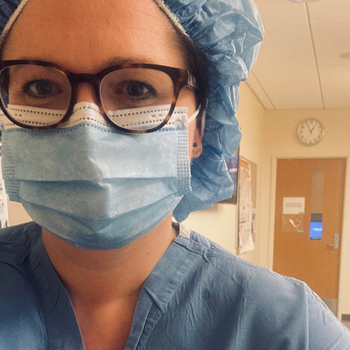Rachael Forsythe graduated with her MBChB in 2008. She works as a consultant vascular surgeon.
 Tell us a bit about your time at university. Any particular memories?
Tell us a bit about your time at university. Any particular memories?
I initially struggled to adapt to being a very academically average student. I almost failed my first anatomy exam, despite spending lots of time rummaging through boxes of hearts in the basement of the anatomy department, desperately trying to learn the names of the various appendages!
Once I’d learned to accept that I was never going to excel academically, I leaned in to the social aspects of university. I made some fantastic friends, many of whom are still my closest friends 20 years later, did my fair share of partying but also recognised, towards the end of medical school, that I was intrigued by audit and research.
What have you been up to since graduation?
Foundation Training in South East Scotland followed by two fantastic years at Bristol Royal Infirmary for core surgical training. Despite accidentally walking into a broom cupboard when trying to leave the room in my ST3 interview (“cupboardgate”), I got my first choice surgical rotation in South West London, rotating through Croydon and St Georges Hospital.
After ST4 I undertook a PhD with Professor David Newby in Edinburgh. I then transferred deaneries and spent the rest of my vascular training in Edinburgh, with a year in Dundee.
I’ve been a constultant in Edinburgh since October 2022, after mini fellowships in Leicester and the USA. I was president of the Rouleaux Club (the UK national vascular trainee organisation) and have just been appointed as Chair Elect of the Circulation Foundation and onto the executive council of the Vascular Society of Great Britain and Ireland. I sit on the editorial board for a number of journals, teach on the UoE ChM and am a PhD co-supervisor. I’m married with two kids, cats, chickens and a duck!
Tell us a bit about working in vascular surgery. Why did you choose this specialty?
I had a “Damascus moment” as a junior doctor during an open thoracoabdominal aneurysm repair in Edinburgh. It sounds twee but I still remember the really unexpected moment of clarity. It’s wild to think that I now assist in this operation.
It’s also very varied – we operate all over the body – and I enjoy the challenges and variety of my theatre lists. It is, however, a very humbling speciality and things can go wrong very quickly and catastrophically. That has certainly caused a few sleepless nights, but I have a brilliant bunch of consultant colleagues who are all very supportive.
Tell us a bit about your research, did you always envisage getting into research?
 During medical school, I felt like I wasn’t smart enough to ever imagine doing proper research but I later stumbled upon a number of great opportunities which have lead me here.
During medical school, I felt like I wasn’t smart enough to ever imagine doing proper research but I later stumbled upon a number of great opportunities which have lead me here.
Early in training, I met Rob Hinchliffe, who is now Professor of Vascular Surgery in Bristol, and we exchanged email addresses over a distal bypass in St George’s Hospital when he asked if I wanted to help with a project. This lead to many papers, book chapters, involvement in international committees and more. I would count Prof Hinchliffe as one of the most important influences on my career. I’m not sure he realises that he’s made such a big impact (thanks, Rob, if you ever read this!).
What do you enjoy most about being a clinical researcher?
It’s important that I’m a surgeon first – being in the operating theatre is hugely rewarding. I am fully NHS employed but have an honorary UoE contract and do research because I also love the excitement of discovering (or at least trying to discover) new information.
My research has always been very clinical and I enjoyed working with patients during my PhD, when I used novel imaging techniques in patients with abdominal aortic aneurysms. Recruiting into clinical studies is very rewarding, as there is always the hope that I will learn something that can change practice for the better and improve the lives of our patients.
I also love sharing research on the national and international stage. I’ve travelled quite a bit and always feel energised and inspired going to conferences or visiting vascular surgeons in other institutions.
Any particularly memorable moments in your career to date?
Aside from cupboardgate, a few moments stand out. I remember the thrill of putting the clamp on the aorta in my first open ruptured abdominal aortic aneurysm repair. I was quite junior at the time but the consultant (Mr Zahid Raza) was so supportive – he even shook my hand when the clamp was on and the patient stabilised. I remember everything about that case.
Whilst I’ve been incredibly well supported during my career, there are a few less positive moments. I was advised by a very eminent academic that I’d never succeed in surgery because I hadn’t shown interest early enough and that academic jobs were “ring-fenced early for trainees with great potential” (and, by implication, that wasn’t me). I kept going anyway but it wasn’t because I was trying to prove a point – I just figured that I would definitely not succeed if I didn’t at least try. I think I always assumed that I’d hit an insurmountable roadblock at some point but that hasn’t happened yet…
What are your aspirations for the future?
 I hope to have some academic time formally incorporated into my job. I have recently submitted a very exciting grant application (in my opinion – let’s see what the funder thinks!) and have some big ideas for where next to take my imaging research.
I hope to have some academic time formally incorporated into my job. I have recently submitted a very exciting grant application (in my opinion – let’s see what the funder thinks!) and have some big ideas for where next to take my imaging research.
What do you enjoy doing when you’re not at work?
I like to run and cycle. I’m a relapsed couch potato but I know that I feel so much better – physically and mentally – when I exercise. I usually need to set myself an almost unachievable goal in order to motivate myself to exercise regularly.
I also enjoy cycling – but I’m more of a “tootler” and am terrible at hills; my cycling trips are very tame and usually punctuated by stopping for cake and coffee.
I have also fallen back in love with books. I re-discovered the joy of escaping into a good old mainstream novel a few years ago. I’ll save the classics for retirement when I’ll hopefully have a bit more bandwidth for high prose!
Any advice for current medical students?
Keep an open mind about what you want to do. Absolutely nobody in medical school would have imagined that I’d be a vascular surgeon (including and especially me). Until you’ve held and used a scalpel, don’t discount a career in surgery. It’s an incredible privilege.
Don’t be put off surgery if you want to have a family or a time-consuming hobby. It is hard work but so are lots of rewarding jobs. You don’t have to look far to see plenty of surgeons who have successful and fulfilling personal and professional lives, and I’d count myself in that. However I think it’s all about timing – I think you probably can have everything but just not all at the same time. There is a season for everything – don’t try to do it all at once.
And finally – it’s a long game, so pace yourself. Don’t dedicate all your time to work – you’ve got the rest of your career to do that – and I’m glad I did spend those late university years partying hard!
Final thoughts…
The most positive theme of my career has been the great people around me. It’s far more important to work with a good team than in a good building and I think many of my decisions have been influenced by meeting brilliant people along the way. It’s not been perfect, of course, but I wouldn’t have thrived in an environment where I didn’t have people in my corner looking out for me. No surgeon is an island! Find good people and you’ll go far.



